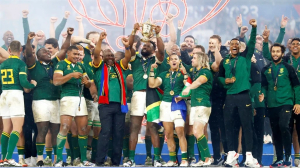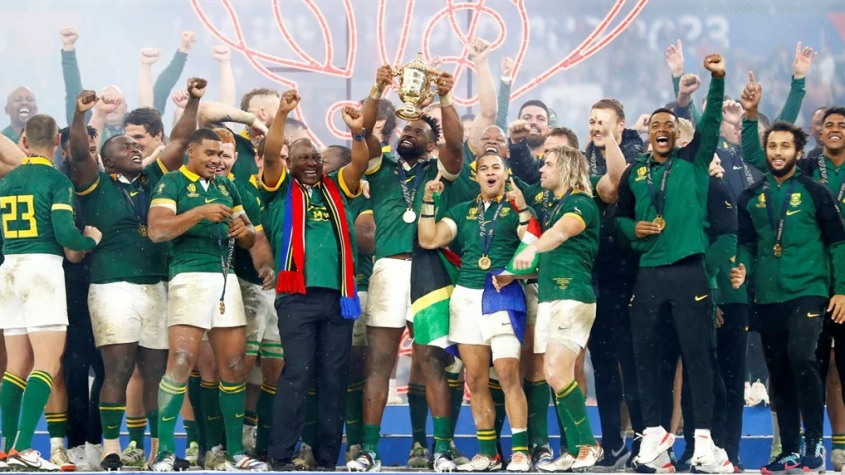BLOG | In Context: A South Africa “Nobody Else Understands”

This week I am writing as a South African, the southernmost country on the African continent. I am a proud South African pan-Africanist, to be exact!
Two weeks ago, something profound happened in the world – South Africa’s national rugby team, a.k.a. the Springboks, became the first and only four-time holders of the Rugby World Cup’s Webb Ellis trophy.
After the win, the first black captain of the Springboks, Siya Kolisi, a two-time Rugby World Cup winner, said: “The other countries don’t understand. You have to be a South African to understand the hardships you [we] go through in this country.
“We are very diverse [as a team],” he said, adding, “Diversity is our strength in South Africa. I want to encourage Mister President and the cabinet; we need to use our diversity a bit more. It is a powerful force that a lot of countries don’t have, that we can use. Coming from different backgrounds and different areas, we see life differently.”
I landed back home in Johannesburg 2 hours before kick-off of the final match of the 2023 Rugby World Cup and immediately headed out to meet friends at a nearby café to watch the epic match. This is what we do as South Africans: we gather together to watch important sporting events. More than anything else, sports have the potential to bridge the most divisive tendencies, including racial divides.
True to Kolisi’s statement, you have to be a South African to understand. I come from a history of oppression spanning not just a century but hundreds of years of colonisation as well as apartheid and racial segregation. Our rallying call of #StrongerTogether has become something very meaningful to us.
South Africa’s colonial history is unique. This country has been colonized since 1652, beginning with the Dutch. Official British colonization began in 1795 alongside the Dutch for a few years, give or take, and then British sole occupation until 1961, at which point they did not ‘decolonize’ us like in other parts of Africa. Instead, they handed over the country to the white Afrikaaners, ushering in a new period of oppression called Apartheid until 1994.
While most may know the general history of South Africa, I think it’s important to point out that we shouldn’t be painted with the same brush of ‘decolonization’ as the rest of the continent. We are a very young democracy that is merely 29 years old, compared to countries in the rest of the continent that mostly gained their independence in the 1960s – when we were starting our next round of oppression, which would last another 30 years. And this is the crux of it.
As an advocate of the African Union Free Movement Protocol (AU FMP), I am embarrassed by stories of how border officials deal with other Africans arriving in our country, the xenophobic attacks on other African nationals as well as the high rate of rejections of the visa applications of African nationals. While there is very little I can do about this unfortunate reality, truth be told, I have often wondered why South Africa has not even signed this truly progressive piece of Pan-African legislation – the AU FMP.
Therefore, I was elated when, in 2022, I learned about South Africa’s granting up to 90 days of visa-free travel to Kenyans, which was followed by a code-share partnership with Kenyan Airlines, which gave us a case study of how the FMP would ease intra-African travel.
More recently, South Africa reached an agreement with Uganda to allow holders of Ugandan service and diplomatic passports to travel to South Africa visa-free and also resolved that Ugandan and South African immigration officers set up a committee to discuss the removal of visa requirements for ordinary Ugandan passport holders. Relatedly, last October, the governments of Ghana and South Africa announced a visa waiver agreement to allow all citizens of both countries to travel visa-free.
As I stood amongst cheering, crying and exuberant South Africans across the country’s racial divide hugging each other, all of us singing, celebrating and listening to Siya Kolisi utter those now famous words that nobody else understands what it means to be South African, I thought, of course, nobody else would understand!
No one else would understand the length and breadth of oppression in South Africa and of South African’s minds and spirits – the feeling of being invaded for generations. For example, British colonial rule in both South Africa and India allowed the Britons to bring indentured (slave) laborers from India to South Africa to work in their sugar cane plantations. It was as a result of this policy that I now call myself a sixth-generation South African of Indian origin.
But why did another oppressed race need to be brought to South Africa? We can all guess why, but this feeling of being constantly invaded is now deeply rooted in our epigenetics.
In the rest of Africa, most of the people who lived through colonization have passed on, whereas in South Africa, even 30-year-olds were born under apartheid. I, for example, remember Apartheid like it was yesterday: I remember going to racially segregated schools, how we could not go to the same beaches as Whites, Blacks or Coloreds or how there were places we could not go to at all because we have melanin in our skin.
I cannot, by any means, justify South Africa not signing the AU FMP. As I ponder the African Continental Free Trade Area (AfCFTA) and South Africa’s future role in boosting intra-African trade, I realize that South Africa is the continent’s most industrialized nation and therefore stands to benefit more from the AfCFTA than any other country. Yet, why are we foot-dragging on signing the FMP, which is as important as the AfCFTA itself?
It’s understandable that, as a people, we are grappling with a lot more than anyone else can understand, and clearly, it’s going to take a long time for us to remove the effects of generational oppression from our genetics. Yet, I keep wondering how the AfCFTA’s full potential will be realized by South Africa without the AU FMP.
















